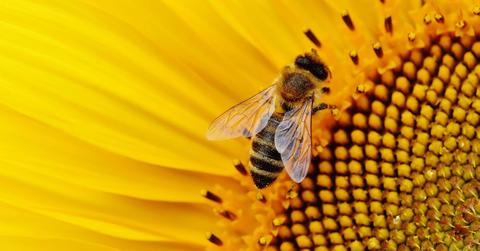How Mushrooms Could Help Save Honey Bees
A new study suggests that a fungal extract could immunize honey bees against two major viruses, and help combat the plunge in bee populations.
Updated Oct. 10 2018, 5:34 p.m. ET
Environmentalists have been sounding the alarm on honeybee populations since 2006, when beekeepers started noticing mass — and seemingly freak — deaths among their hives. They were witnessing colony collapse disorder, a frustratingly vague phenomenon that’s caused by pesticides, poor nutrition, habitat loss, disease, or all of the above.
Colony collapse disorder has continued to ravage honey bee hives to this day, but a new scientific study points to a possible antidote. The paper suggests that mushrooms may boost honeybee immune systems, helping them ward off some of the viruses associated with colony collapse disorder.
The research was published in the peer-reviewed scientific journal Nature. For this study, the scientists separated their honey bees in to control and test colonies. Bees in the control group received a normal diet of sugar syrup, while those in the test group got sugar syrup boosted with a fungal extract.
The team soon discovered that the colonies consuming mushroom bits suffered fewer cases of deformed wing virus (DWV) and Lake Sinai virus (LSV). In fact, bees in the test group saw a 79-fold reduction in DWV and a 45,000-fold reduction in LSV. These strong numbers led the scientists to conclude that “honey bees may gain health benefits from fungi and their antimicrobial compounds.”
The fungal extract in question is the mycelium, a collection of web-like filaments found in mushrooms. Paul Stamets, the lead author on the study, has been examining the magical properties of mycelium for over 30 years. Stamets picked up on their potential applications for honey bees in 1984, when he noticed the bees in his backyard behaving strangely.
As Stamets recalled to Mother Jones, the honey bees were slurping water droplets off his mushrooms, somewhat insistently. They were even pushing wood chips out of the way to get to the mycelium. He assumed they were after the fungi’s natural sugars until — many years later — he thought differently.
Stamets knew mycelium carried antiviral properties, and began wondering if the bees were medicating, rather than feeding. “I had this waking dream,” he told Mother Jones. “I think I can save the bees.”
Stamets soon started collaborating with Walter Sheppard, the head of entomology department of Washington State University. The pair examined the effects of mycelium in the lab over several years, with additional assistance from researchers at the college and U.S. Department of Agriculture.
Sheppard is one of the 12 authors on the Nature study, along with four other Washington State scientists.
For Stamets, the research is the culmination of many years of hard work. In addition to writing six books on mushrooms, he develops and sells fungal cultures, capsules, and growing equipment through his company Fungi Perfecti.
“Up until this discovery, there were no antivirals reducing viruses in bees,” Stamets told Mother Jones. “Not only is this the first discovery, but these extracts are incredibly potent.”
Stamets and his colleagues still don’t understand exactly how the mycelium is reducing illness among honey bees. Pinpointing a more precise cause and effect will be the focus of the next round of research, which is already under way. According to Wired, Stamets is currently testing “several hundred more beehives,” which will hopefully provide clearer answers on the best way to fight colony collapse.
